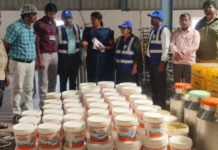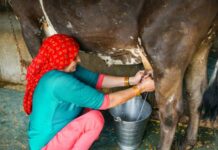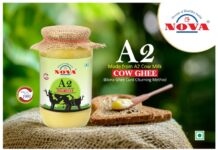Mumbai, March 25:
Ashok Sharma, President and Chief Executive of agribusiness, said the company has ambitious plans for the division.
In an interview with BusinessLine , Sharma said the company wants to play a big role in the market, which is spread across the country and has a yearly turnover of Rs. 20 lakh crore. The company has identified dairy products, pulses and edible oils as key growth areas. Excerpts:
How do you plan to expand your agribusiness further?
In 2009, Mahindra and Mahindra became the top tractor maker in the world. But from 2007 itself, the management was thinking – what is the next level the company could reach. Then it was decided that the company must be present in the whole farming value chain.
It was realised that agriculture was a Rs. 20-lakh crore annual opportunity, with many under-served areas and lots of quality and consistency challenges. Given Mahindra’s rural connect with farmers due to the tractor business, a separate vertical for agribusiness was created in 2010.
Initially, the company started selling seeds, agriculture chemicals and micro-irrigation systems. About three years back it moved closer to farmers by dealing in horticulture products. Today, it is the largest exporter of grapes and handles 13,000 tonnes, which is mostly exported to Europe. The grapes meet all the European Union-stringent quality and safety norms. The success in the grapes business will be replicated in pulses, edible oils and dairy products.
For better agri-products the company is always interacting with farmers.
How big is the opportunity in the Indian dairy sector?
In the dairy business, the company realised that milk distribution and sale was very unorganised. In the last ten years, the sale of loose milk has fallen from 80 per cent to 70 per cent. It means there is a shift in consumer preferences, and they want milk from organised players.
The all-India milk products market is Rs. 4-lakh crore. Even the largest player in the market manages to sell only Rs. 20,000 crore of products per year, which is only five per cent of the market. Rest of the 95 per cent still consist of small players and local sellers.
How is the company going about its milk business?
When the milk is collected from farmers, the quality and fat content in the milk are measured. The process is electronic with no human intervention. Based on these parameters, the remuneration of the farmers is set. The company also ensures that cattle are fed with better, nutritious food so that they give more milk. Once a cow is milked, bacteria start to build-up. Therefore, in order to reduce the bacterial load, the company has provided the farmers with stainless steel cans instead of aluminium cans. It reduces the bacterial load significantly.
The quality of milk is also maintained by chilling the milk at 4 degree Celsius within four hours of milking the animal.
Mahindra has also brought in a tamper-proof packing for milk pouches. If the plastic pouch gets tampered with a syringe, then it will show a blue colour at the site where it is pierced. Milk suppliers sometimes use large syringes to extract milk from the pouch and fill it with water.
The company is it targeting to supply 10,000 litres of milk per day to the consumers in Indore. Once the milk business gets stabilised, curd, Lassi, Ghee and other milk products will be launched.
The agri-product market in India is a large but fragmented market. What strategy has Mahindra adopted?
For pulses, the company is targeting consumers in Mumbai. For edible oil and milk, we are tapping customers in West Bengal and Madhya Pradesh, respectively. The company wants to establish its brand in one geographical area before moving on to other markets.
For getting the supply chain in order, the company officers are working with pulses farmers in Latur region of Maharashtra and mustard farmers in Kota region of Rajasthan. The best farming practices are being shared with farmers. – The Hindu BusinessLine
- Advertise
- Categories
- Awards
- Manufacturers
- Chilling Centers
- Directory
- Company Profile
- Jobs
- Consulting
- Daily Updates
- Dairy Plants
- Dairy Products Manufacturers
- Educational Institutions
- Equipments & Machines
- Events
- Feeds
- Finance
- Franchises
- Gadgets
- Gadgets & Technology
- Importers & Exporters
- Imports & Exports
- Institutions
- International
- Investment
- Joint Venture
- News
- Latest News
- Loans
- Loan Against Property
- Loan for Equipment & Machineries
- Market
- Marketing/Social Media
- Milk Products
- National
- News Features
- News Reports
- Organizations
- Packaging
- Policies & Regulations
- Product Launches
- R&D
- Research Institutions
- Retail
- Service Providers
- Special Reports
- Standards
- Suppliers of Milk & Milk Products
- Supply Chain
- Technology
- Training
- Unsecured Business Loan
- Veterinary Doctors
- Veterinary Drugs & Medicines
- Veterinary Hospitals
- Veterinary Laboratories
- Video
- Videos
- Who's who
- Working Capital Loan
































